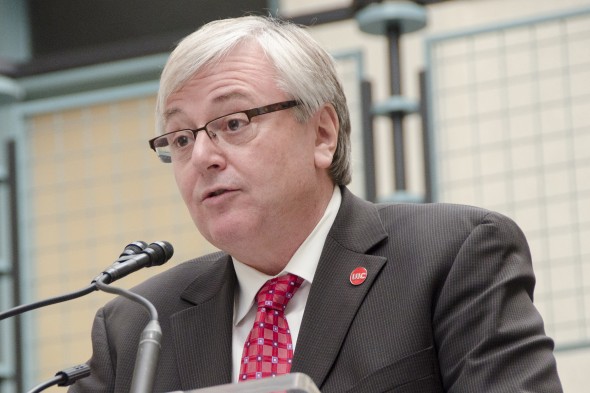UIC must protect ‘core values’ in dealing with budget cuts

In the face of proposed cuts in state funding, UIC must enhance efficiency, reduce administrative costs and “find new money,” says Chancellor Michael Amiridis. Photo: Roberta Dupuis-Devlin/UIC Photo Services
Taking a “the buck stops here” approach, Chancellor Michael Amiridis discussed the FY 2016 budget crisis at a campus town hall Tuesday.
“Whatever goes wrong is my fault,” said Amiridis, “so I’ll try to answer most of the questions.”
Questions were submitted in advance of the town hall, held by the Academic Professional Advisory Committee and attended by more than 250 people at Student Center West and others via webcast.
Amiridis said the university began planning for a 20 percent budget reduction in January, only to be confronted in February with the possibility of a cut of 31.5 percent proposed by Gov. Bruce Rauner.
In facing the crisis, “what you choose to protect are your core values,” Amiridis said. “Otherwise, this shows no leadership, no leadership at all.”
Those values? “Make academic programs strong and accessible, maintain the quality of research, and grow the recruitment and retention of students and faculty from diverse backgrounds,” the chancellor said.
At the same time, UIC must enhance efficiency, reduce administrative costs, and “find new money,” he added. Cuts should be made strategically, not across the board, Amiridis said, promising that administrative units will absorb higher losses than academic units.
Other questions the chancellor answered:
• How can employees help? “Give examples of how UIC benefits Chicago and the state — especially jobs,” he said. And stick together. Setting faculty or staff against students or each other would in the end “make things much, much worse.”
• What will happen to tuition? It won’t change this year or next, he said, but what happens after that “remains to be seen.”
• Will UIC remain a public university? “I didn’t know this was an option,” Amiridis said. “I don’t want to work for a private institution.”
• Where will new money come from? One source is adult continuing education, in which “we should make sure we are primary players,” he said.
• What about staffing levels? “Furloughs make no sense to me — the only thing you gain is maybe to delay difficult decisions,” the chancellor said. “We should scrutinize every hire we make,” he added.
Amiridis shared the stage with other top administrators. Eric Gislason, interim provost and vice chancellor for academic affairs, had some good news even his boss hadn’t heard — that UIC received more student applications, made more offers of admission, and received more letters of intent to enroll for the coming academic year than ever before.
“It will be one of the few universities in the state that will have a full class enter in the fall,” Gislason said.
In closing, Amiridis told his audience what most attracted him to UIC.
“It is a research powerhouse, accessible and affordable to large numbers of students of diverse backgrounds,” he said. “You don’t find many institutions like this.”
